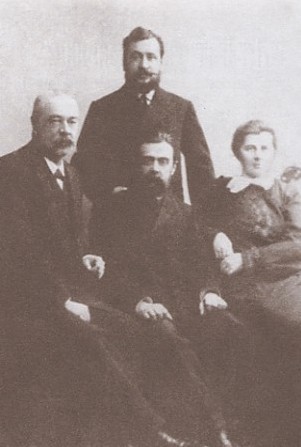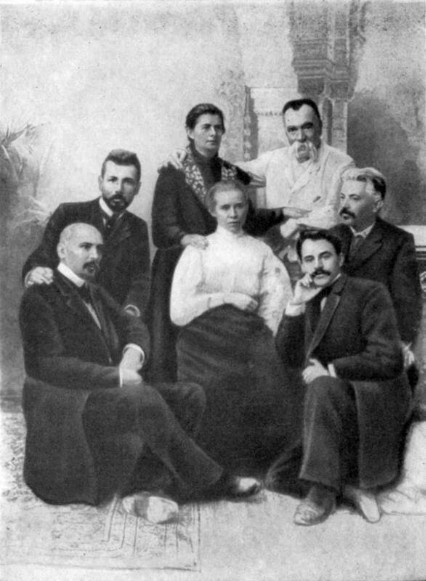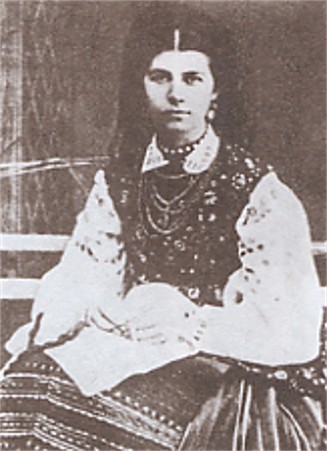Pchilka, Olena
Pchilka, Olena [Пчілка, Олена; Pčilka] (pseud of Olha Kosach), b 29 June 1849 in Hadiach, Poltava gubernia, d 4 October 1930 in Kyiv. Writer, community leader, and ethnographer; mother of Lesia Ukrainka and sister of Mykhailo Drahomanov; corresponding member of the All-Ukrainian Academy of Sciences from 1925. She recorded folk songs, folk customs and rites, and collected folk embroidery in Volhynia. She published her research as Ukraïns’kyi ornament (Ukrainian Ornamentation, 1876). She also funded the publication of Stepan Rudansky's Spivomovky (Singing Rhymes, 1880). In 1883 Pchilka began to publish her own verse and short stories in the journal Zoria (Lviv). Her first collection was titled Dumky – merezhanky (Thoughts – Embroideries, 1886). Pchilka was also an active participant in the women's movement, who edited and published, with Nataliia Kobrynska, the first feminist almanac, Pershyi vinok (The First Wreath, 1887). In the 1890s Pchilka lived in Kyiv, and from 1906 to 1914 she was editor and publisher of the journal Ridnyi krai and its monthly supplement, the children’s magazine Moloda Ukraïna (1908–14). Besides her many poems, tales, and stories for children Pchilka wrote numerous plays: Vesnianyi ranok Tarasovyi (Taras's Spring Morning, 1914), Kazka zelenoho haiu (The Tale of the Green Wood, 1914), Shchaslyvyi den’ Tarasyka Kravchenka (Little Taras Kravchenko's Lucky Day, 1920), Skarb (The Treasure, 1921), Myr myrom (Peace through Peace, 1921), Kobzarevi dity (The Kobzar's Children), and others. Pchilka translated and reworked many classics of world literature, by Ovid, Adam Mickiewicz, Aleksandr Pushkin, Johann Wofgang von Goethe, Nikolai Gogol, Hans Christian Andersen, and Victor Hugo. She also wrote publicistic prose, essays of literary criticism, biographies, and an autobiography: M.P. Staryts’kyi (1904), Marko Kropyvnyts’kyi iako artyst i avtor (Marko Kropyvnytsky as Actor and Author, 1910), Ievhen Hrebinka i ioho chas (Yevhen Hrebinka and His Times, 1912), Mykola Lysenko (1913), Spohady pro Mykhaila Drahomanova (Recollections about Mykhailo Drahomanov, 1926), and Avtobiohrafiia (Autobiography, 1930). Pchilka's most significant works in ethnography and folklore are Ukraïns’ki uzory (Ukrainian Ornamental Designs, 1912, 1927), Pro legendy i pisni (About Legends and Songs), and Ukraïns’ki selians’ki maliuvannia na stinakh (Ukrainian Peasant Wall Paintings). Her collected works have been published as Opovidannia (Stories, 3 vols, 1907, 1909, 1911) and Opovidannia (Stories, including her autobiography, 1930).
Petro Odarchenko
[This article originally appeared in the Encyclopedia of Ukraine, vol. 3 (1993).]
.jpg)


.jpg)
